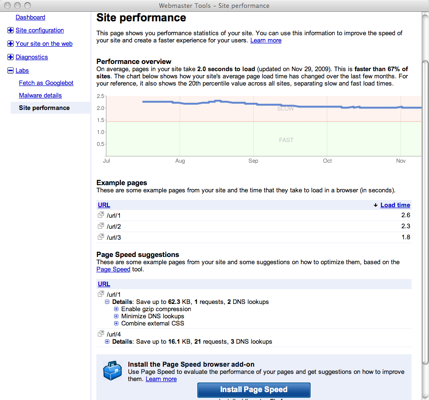 Reading Time: 2 minutes
Reading Time: 2 minutes*Note – Check out our more recent article on this topic: Understanding Google PageSpeed Insights.
I am pretty certain that after reading the title of this post that you thought about the speed of your site but couldn’t pin it to a precise number because it is a metric you never worry about. Well, it is time to start paying attention to this site metric, because it may be a factor in your rankings in Google in 2010.

Google recently announced a new experimental feature in Google Webmaster Tools that will allow you to see your average site load time. Google will analyze your site load time as compared to other sites on the Internet, using data gathered via the Google Toolbar. Google then shows some sample page load times as well as suggestions for optimizing the speed of the site.
“On average, pages in your site take 2.0 seconds to load (updated on Jan 10, 2010). This is faster than 67% of sites.”
The most common types of recommendations I have seen on some sites include but are not limited to:
- Enabling gzip compression
- Combining external JavaScript
- Minimizing DNS lookups (this means minimizing the calls to external service scripts such as ShareThis, ReCaptcha, Gravatar or any other external services you may be referencing)
- Combining CSS files
You can also use the Page Speed plugin to get an even more in depth look at other areas that you can tweak in order to improve your page load time. Or if you just want to see how long it takes to load each object within your page, you can use the free tool at from Pingdom.
If you want to learn about best practices for site load performance, I suggest starting here.
The page speed project within Google Code has been around longer, but Google seems to really be putting an emphasis on this metric and encouraging webmasters to pay attention as well. Granted, I haven’t seen evidence that they are currently using this as a ranking metric, but it is always possible that this could become one of their more than 200 ranking factors if it hasn’t already. So it is time to start getting familiar with your site’s page speed and make the necessary changes to give you a competitive advantage. Even if they don’t base your rankings on this data, studies do show that faster loading sites lead to a better user experience so it is definitely worth your efforts.
At Vizion Interactive, we have the expertise, experience, and enthusiasm to get results and keep clients happy! Learn more about how our SEO Audits, Local Listing Management, Website Redesign Consulting, and B2B digital marketing services can increase sales and boost your ROI. But don’t just take our word for it, check out what our clients have to say, along with our case studies.




